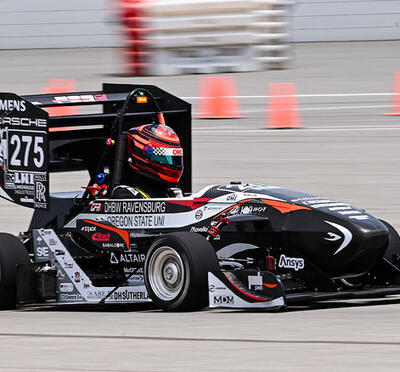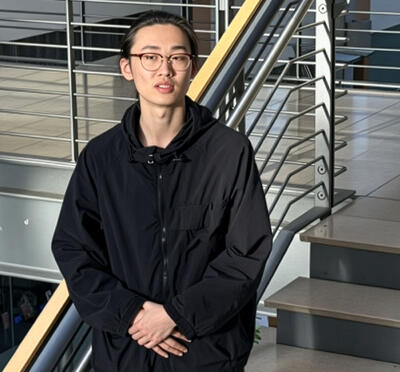Oregon State University's artificial intelligence graduate program stands at the forefront of education and research, offering a highly advantageous opportunity for industry collaboration and access to top-tier master's and Ph.D. degrees. With a large and rapidly expanding faculty team of 34 members dedicated to the field of AI, the program is committed to driving advancements across multiple scientific areas of interest.
The highly competitive program drew 132 Ph.D. and 403 M.S. applicants for the 2023-24 academic year. Along with students in CS specializing in AI, the program currently enrolls 96 Ph.D. students and 73 M.S. students. With growing enrollment and newly introduced capstone projects for master’s students with strong interest, the program is successfully meeting the industry demand for AI workforce development and providing valuable opportunities for students across CS and AI fields to apply their skills in real-world projects. Additional ways industry can engage AI students and faculty include summer internships and sponsored research projects. AI students are invited to apply directly to discuss potential project fit and collaboration with industry.
Degrees offered
Oregon State's AI program offers a range of graduate degrees that cater to students' diverse interests and career goals. The streamlined curriculum allows students to delve into specific AI interests without extensive computer science prerequisites. The following table outlines AI graduate degrees available:
| Degree Program | Description |
|---|---|
| Ph.D. | Aimed at students who will be taking research and teaching positions in academia, industry and government, and leading AI companies. |
| M.S. (Thesis option) | Qualifies students for research and development positions in the AI industry. |
| M.S. (Project option) | Qualifies students to get software development jobs in industry. |
Oregon State also offers a graduate minor in AI, enabling students from other degree programs to acquire AI skills applicable to their respective disciplines. The minor requires 15 credits for master's students and 18 credits for Ph.D. students, including a core set of 12 credits from designated AI courses.
The Accelerated Master's Program is another notable offering within the AI graduate program. It provides a fast-track option for exceptional undergraduate students to transition seamlessly into the master's program. By reducing prerequisites, the AMP enables motivated students to embark on their AI journey earlier, amplifying their learning and research opportunities.
Student prerequisites
Prospective students considering Oregon State's AI graduate program can expect a rigorous yet supportive academic environment. While prior experience in AI is not mandatory, a strong foundation in mathematics, computer science, and AI fundamentals is advantageous, as is a general passion for learning AI. The program provides students with the necessary resources and mentorship to excel, ensuring they are well-prepared to make significant contributions to the field.
Interdisciplinary collaboration and program strengths
One of the biggest strengths of Oregon State’s AI graduate program is its accessibility. Students from any prior major can apply to the program. Their readiness may be demonstrated through traditional coursework, but also through personal projects that show they are prepared to develop the theoretical and software development skills they will need to succeed.
By integrating knowledge and methodologies from different disciplines, students develop a holistic perspective on AI's role in solving complex problems. For example, students specializing in AI and biology are exploring the use of AI algorithms in genetic analysis and the understanding of biological systems, while those in AI and environmental science are developing models to analyze climate data and predict environmental changes.
Faculty and curriculum development
Oregon State’s AI graduate program has experienced remarkable growth in recent years, attracting a large number of talented individuals from around the world. With 34 faculty members from the School of Electrical Engineering and Computer Science focused on AI, the energy and broad capabilities are breeding real innovation. These experts specialize in various aspects of the field, including machine learning, computer vision, natural language processing, and robotics. Faculty are always introducing new courses and updating course material to keep up with the fast pace of progress in these areas.
Industry partnerships and networking
Collaborating companies that choose to engage with Oregon State's AI graduate program gain access to a vibrant and multidisciplinary community of scholars and researchers, as well as exceptional master's and Ph.D. candidates. Faculty are already working with a large number of government and industrial partners, including Intel, NASA, HP, Facebook, Microsoft, Google, Uber, and others. The program is looking forward to building additional relationships and projects with new partners, particularly in Oregon. AI students regularly do internships with industry, and the crop of potential interns continues to grow with the program.
In addition to the typical summer internships and sponsored research, there is a newer AI M.S. capstone. The capstone is a three-term sequence in which students work on AI-related projects solicited from industry and other partners. Potential partners can contact the program at AI@oregonstate.edu to explore their proposals.
Examples of prior projects have included developing machine learning tools to prioritize inspections by fire departments based on historical fire data, analyzing drone video over the ocean to detect surfacing whales and compute their health profiles, and identifying individual skunks from wilderness cameras to help monitor the population, among others.
If you’re interested in connecting with the AI and Robotics Program for hiring and collaborative projects, please contact AI-OSU@oregonstate.edu.



